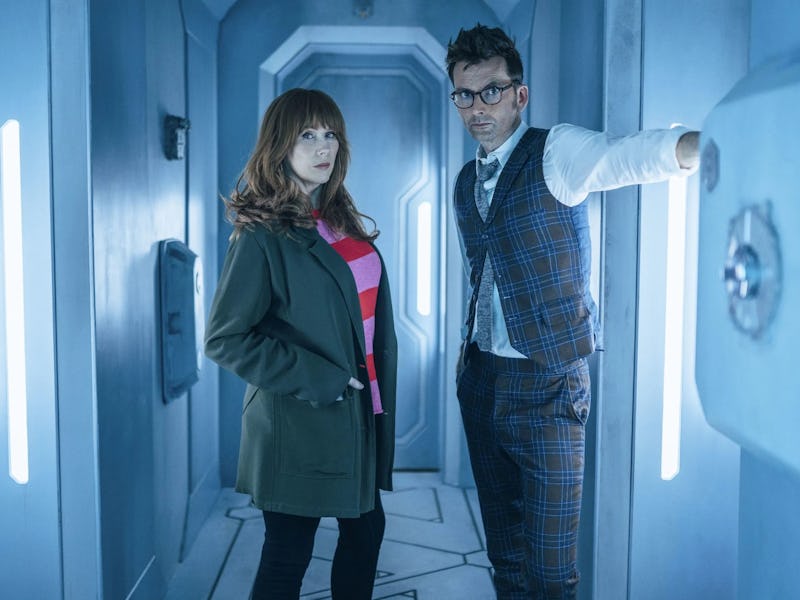Doctor Who Just Confirmed Its Most Controversial Canon Reboot
It's a timeless tale.

The Timeless Child: It was the retcon that shook one of the oldest sci-fi fandoms in history. And, per the latest 60th-anniversary episode of Doctor Who, it’s here to stay. But by reckoning with its recent past, Doctor Who might be finally allowing itself to evolve in a really exciting and unexpected way.
Doctor Who’s most recent 60th-anniversary special, “Wild Blue Yonder,” is a terrific return to form for the show, with a tense, horror-tinged hour that drew from paranoid sci-fi classics like The Thing and the show’s own all-time great episode “Midnight.” While it was mainly a one-off adventure (the more cynical might call it a filler episode) that allowed the 14th Doctor (David Tennant) and Donna (Catherine Tate) to get back into their old rhythms, the episode made a few offhand references to the previous era under Chris Chibnall that suggests a significant new approach for returning showrunner Russell T. Davies’ era going forward.
Spoilers for the Doctor Who 60th anniversary special “Wild Blue Yonder” follow!
The Doctor and Donna assure each other after the TARDIS takes off.
Penned by Davies and directed by Tom Kingsley, “Wild Blue Yonder” follows the Doctor and Donna as they crash-land in a spaceship floating at the edge of the universe. When the repairing TARDIS suddenly takes off without them, they’re left to ponder the spaceship’s many strange mysteries: why is there a rusty robot moving very slowly down a very long corridor? What is that mysterious routine clanking sound? Where did all the life on the ship go? And who opened the escape door three years ago? When they find themselves facing off against sinister doppelgangers of themselves who seem intent on copying every aspect of their identity, the Doctor and Donna have to come to terms with their years apart, and the shadowy part of his past that the Doctor has been hiding from Donna.
But we, the audience, know what the Doctor has been hiding. The 13th Doctor discovered the real origins of their past in the extremely controversial 2020 episode “The Timeless Children,” which revealed that the Doctor was not in fact a Time Lord from Gallifrey, but an alien from an unknown region of the universe whose ability to regenerate was exploited to turn Gallifrey into the powerful empire that it became. It was a retcon of the Doctor’s origin that was so ill-received that the BBC had to issue an apology to upset viewers (an apology that doesn’t undo the damage of turning the Doctor into a Chosen One hero, but we can argue about that later). Many fans even speculated that Davies might do away with the Timeless Child origin altogether when he returned as showrunner, but the reference in “Wild Blue Yonder” not only cements it as canon, it makes it a pivotal part of the Doctor’s characterization going forward.
The Doctor is forced to contend with consequences of a past iteration, a rarity in the show.
The reference takes place after the Doctor and Donna get separated while fleeing from the doppelgangers (who had grown to gigantic size in the show’s rare instances of true body horror), and the Doctor encounters Donna again. Or, at least, a Donna. While attempting to figure out whether either of them are real, Donna lets slip that in her brief transformation back into the Doctor-Donna in “The Star Beast,” she was able to access all of the Doctor’s memories over the past 15 years (we’re guessing this doesn’t include the four billion years spent in the confession dial in “Heaven Sent”). This includes the Doctor’s discovery that they are the Timeless Child, and the
“You don’t know who you are, do you?” Donna says, tapping into the Doctor’s biggest fear. Though this Donna was soon revealed to be the doppelganger, that doesn’t change the fact that this mysterious origin is something the Doctor is running from.
The 13th Doctor was the one who learned about their real origins.
But the Doctor is forced to contend with the consequences of the Timeless Child again, when it’s revealed that this empty part of the universe resulted from the Flux, the cosmic weapon unleashed by the Doctor’s adoptive mother Tecteun, destroying half the universe. This is an intriguing bit of continuity for Doctor Who, a show that always took canon as more of a suggestion than a rule. If half the universe is destroyed, and the Doctor carries the burden of not having stopped the Flux, what could this mean for the Doctor’s characterization in the new Davies era? We saw Tennant whip out that good old angsty scream in “Wild Blue Yonder,” but could this mean that this guilt will carry over in Ncuti Gatwa’s 15th Doctor? And will the Doctor continue to go on adventures where he’s faced with the consequences of universe-altering events like Flux?
It’s an exciting prospect, considering that every new iteration of the Doctor has rarely felt like the same character — simply wiping the slate clean and moving on to the next adventure. And it’s an intriguing challenge for Davies, to deal with a universe that is decidedly smaller than it is and may be hurting from the Doctor’s failures. Everyone may not be happy that the Timeless Child is really, truly canon, but if it means that the Doctor has more emotional and cosmic challenges ahead of him, that might make it forgivable.